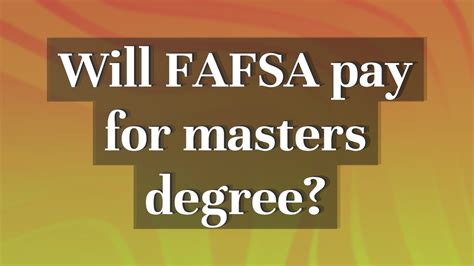The Free Application for Federal Student Aid (FAFSA) is a form that students use to apply for federal student financial aid. Many students wonder if FAFSA can be used to pay for a master’s degree. The answer is yes, FAFSA can be used to pay for a master’s degree, but the amount you receive will depend on your financial need.

How to Apply for FAFSA
To apply for FAFSA, you will need to create an FSA ID. Once you have an FSA ID, you can then go to the FAFSA website and complete the application. The FAFSA application will ask you for information about your income, assets, and expenses. This information will be used to determine your financial need.
How Much FAFSA Will Pay for a Master’s Degree
The amount of FAFSA you receive will depend on your financial need. The maximum amount of FAFSA you can receive for a master’s degree is $20,500 per year. However, the average amount of FAFSA received by master’s degree students is closer to $12,000 per year.
What Types of FAFSA Aid Can Be Used to Pay for a Master’s Degree?
There are three types of FAFSA aid that can be used to pay for a master’s degree:
- Grants: Grants are free money that does not need to be repaid.
- Loans: Loans are money that you borrow and must repay with interest.
- Work-study: Work-study is a program that allows you to work part-time to earn money to help pay for your education.
The Pros and Cons of Using FAFSA to Pay for a Master’s Degree
There are several pros and cons to using FAFSA to pay for a master’s degree.
Pros:
- FAFSA can help you pay for the cost of your master’s degree.
- FAFSA is available to students of all ages and backgrounds.
- FAFSA can be used to pay for both full-time and part-time students.
Cons:
- The amount of FAFSA you receive will depend on your financial need, and you may not receive enough to cover the full cost of your master’s degree.
- FAFSA loans must be repaid with interest.
- Work-study can take away from your time for studying.
How to Increase Your Chances of Getting FAFSA for a Master’s Degree
There are several things you can do to increase your chances of getting FAFSA for a master’s degree:
- Apply for FAFSA as early as possible. The earlier you apply, the more likely you are to receive the maximum amount of aid.
- Complete the FAFSA application carefully and accurately. Any mistakes on your application could delay your processing or result in you receiving less aid.
- Gather all of the required documentation before you start the FAFSA application. This will help you complete the application quickly and accurately.
- Contact your school’s financial aid office if you have any questions about FAFSA. They can help you complete the application and make sure you receive the maximum amount of aid.
Conclusion
FAFSA can be a valuable resource for students who are pursuing a master’s degree. By applying for FAFSA, you can increase your chances of getting the financial aid you need to pay for your education.
